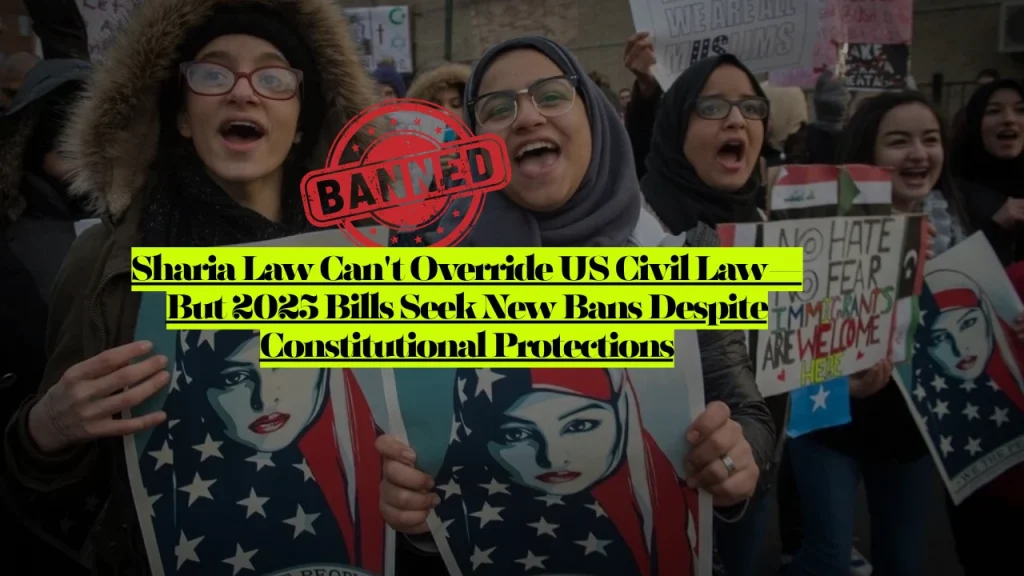Sharia Law in America, Sharia Law Can’t Override US Civil Law—But 2025 Bills Seek New Bans Despite Constitutional Protections
Breaking: Senator Tommy Tuberville (R-AL) introduced two anti-Sharia bills in October 2025, while Florida Rep. Hillary Cassel filed the “No Sharia Act” for the 2026 legislative session, declaring “Florida will never submit to foreign law.”
Sharia law cannot override or replace US civil law under any circumstances. The First Amendment’s Establishment Clause prohibits any religious tradition—including Sharia, Christian canon law, or Jewish halakha—from becoming the basis of laws that apply to everyone. While Muslims can voluntarily follow Sharia principles in personal matters like prayer, fasting, and private contracts, US courts enforce constitutional protections and civil law supremacy when religious principles conflict with American legal standards. As of November 2025, 14 states have enacted foreign law bans targeting Sharia, and new federal legislation is pending in Congress.
What Is Sharia Law and How Does It Differ from US Civil Law?
Sharia (meaning “path to the water” in Arabic) refers to Islamic religious guidance drawn from the Qur’an and Sunnah (teachings of Prophet Muhammad). The term encompasses moral values, religious practices, and ethical principles governing Muslim life.
Fiqh—the human interpretation of Sharia—represents Islamic jurisprudence developed by qualified religious scholars through reasoning and scholarly consensus. Because fiqh involves interpretation, it varies across Islamic traditions and geographic regions.
Personal religious observance: Sharia governs prayer times, fasting during Ramadan, dietary restrictions (halal food), charitable giving (zakat), and pilgrimage obligations.
Private social interactions: Islamic principles guide marriage contracts, inheritance distribution, ethical business dealings, and family relationships.
Public law issues: Historical Sharia included criminal law, governance, and warfare rules for Muslim-majority societies. These provisions have no application in the United States.
US civil law, by contrast, derives from secular legislative processes, constitutional protections, and judicial precedent—not religious doctrine. Civil law applies equally to all residents regardless of faith.
Related Lawsuit Article: John Cooper School Lawsuit, Woodlands Couple Parents Seek $15M After School “Hid” Sexual Assault for Weeks 2024-2025 Status & Legal Claims

Constitutional Framework: Why Religious Law Cannot Override Civil Law
The Constitution establishes clear boundaries preventing any religious legal system from superseding American law.
First Amendment Establishment Clause: “Congress shall make no law respecting an establishment of religion.” This provision prohibits government from establishing any religion as the legal foundation for laws binding on all citizens.
Fourteenth Amendment Equal Protection Clause: Guarantees equal protection under the law regardless of religion, preventing discriminatory application of religious principles by government authorities.
Supremacy Clause (Article VI): Establishes the Constitution and federal law as “the supreme Law of the Land,” overriding any conflicting state or religious law.
These constitutional protections mean that no American court can enforce Sharia law principles when they contradict constitutional rights, federal statutes, or state civil law.
The 2009 New Jersey Case That Sparked Anti-Sharia Legislation
In S.D. v. M.J.R., 2 A.3d 412 (N.J. Super. Ct. App. Div. 2010), a New Jersey trial judge denied a restraining order to a woman whose husband admitted to nonconsensual sex, reasoning the husband lacked criminal intent because he believed Islamic principles required his wife to submit to his demands.
The New Jersey Superior Court reversed the decision in July 2010, ruling the trial judge committed reversible error by allowing religious beliefs to negate criminal conduct. The appellate court stated unequivocally that religious precepts cannot excuse behavior violating New Jersey’s Prevention of Domestic Violence Act.
This case—often cited by anti-Sharia advocates—demonstrates how US appellate courts enforce constitutional protections even when lower courts err. The reversal confirmed that Sharia principles provide no defense against criminal charges or civil protections under American law.

State-by-State: Where Sharia Law Is Explicitly Banned
Since 2010, legislators in over 40 states have introduced bills restricting courts from considering Sharia or “foreign law” in legal proceedings. As of 2025, 14 states have enacted such legislation:
States with foreign law bans: Alabama, Arizona, Arkansas, Kansas, Louisiana, Mississippi, North Carolina, Oklahoma (amended after constitutional challenge), South Dakota, Tennessee, Texas, and West Virginia.
Most statutes avoid naming Sharia specifically, instead prohibiting courts from applying “foreign law” that violates constitutional rights. Oklahoma’s original 2010 ballot measure explicitly banning Sharia was ruled unconstitutional by a federal judge in 2013, prompting the state to amend the law to reference foreign law generally.
Pending 2025-2026 legislation:
- Florida: Rep. Hillary Cassel introduced the “No Sharia Act” for the 2026 legislative session, stating the bill ensures “Florida will never submit to foreign law, including sharia law, in any form, at any time, under any circumstance.”
- Federal: Sen. Tommy Tuberville introduced two bills in October 2025: the “No Sharia Act” (prohibiting Sharia application where it violates constitutional rights) and the “Preserving a Sharia Free America Act” (denying immigration benefits to foreign nationals advocating Sharia law inconsistent with the Constitution).
What Courts Can and Cannot Do with Sharia Law
US courts may reference Sharia principles in limited circumstances within established American legal precedent:
Permitted considerations:
- Enforcing inheritance provisions in wills when individuals voluntarily distribute property according to Islamic principles (freedom of contract)
- Recognizing marriages performed under Sharia in foreign countries for immigration and custody disputes (standard foreign law consideration)
- Allowing religious arbitration when parties voluntarily submit disputes to Islamic tribunals, provided outcomes don’t violate constitutional rights
- Granting religious accommodations (hijab at work, prayer breaks) when they impose minimal burden and don’t violate anti-discrimination laws
Prohibited applications:
- Applying Sharia criminal penalties (corporal punishment, stoning) under any circumstances
- Enforcing marriage contracts that violate equal protection (polygamy, forced marriage, child marriage)
- Accepting religious justifications for criminal conduct (domestic violence, sexual assault)
- Discriminating based on gender in testimony, inheritance, or custody when contrary to civil law
- Denying constitutional protections based on religious principles
UCLA law professor Eugene Volokh, a conservative constitutional scholar, confirms that where US judges reference Sharia, they do so within parameters long established in American legal precedent—not by recognizing Sharia as binding law.
Religious Arbitration: How It Works and Its Limits
Muslims can voluntarily submit disputes to Islamic tribunals for religious arbitration—a practice also used by Jews (Beth Din courts), Catholics, Lutherans, and other faiths for decades.
How religious arbitration functions:
Parties sign binding arbitration agreements choosing religious authorities to resolve disputes according to faith principles. Common subjects include marriage contracts, business partnerships, inheritance divisions, and community disputes.
US courts may enforce arbitration awards under the Federal Arbitration Act (9 U.S.C. §§ 1-16) if the process meets basic fairness standards and doesn’t violate constitutional rights.
Critical limitations:
- Arbitration must be voluntary; coerced participation renders awards unenforceable
- Awards violating constitutional protections (equal protection, due process) are void
- Parties retain the right to reject arbitration and pursue civil court remedies
- Criminal matters cannot be arbitrated under religious law
- Children’s best interests override religious arbitration in custody disputes
A 2013 Pew Research Center study found religious arbitration represents a tiny fraction of American legal disputes, with no evidence of religious law superseding civil law in any US jurisdiction.
Recent Developments: 2024-2025 Legislative Push
The surge in anti-Sharia legislation reflects ongoing political debates about immigration, religious freedom, and national identity rather than actual legal threats from religious law enforcement.
October 2025: Sen. Tuberville (R-AL) introduced federal anti-Sharia bills after delivering a Senate floor speech warning about “radical Islamic extremism” posing national security risks. The bills would prohibit Sharia application violating constitutional rights and deny visas to foreign nationals advocating Sharia inconsistent with the Constitution.
October 2025: Florida Rep. Hillary Cassel (R-Broward) filed the “No Sharia Act” for the 2026 legislative session. Cassel, who switched from Democrat to Republican in December 2024, represents a district with significant Jewish populations. Critics call the bill an “anti-Muslim political stunt” given that no one is proposing Sharia implementation in Florida.
September 2025: Rep. Randy Fine (R-FL-06) and Rep. Keith Self (R-TX-03) introduced companion anti-Sharia bills in the US House of Representatives.
Constitutional law experts and the American Bar Association oppose these measures as unnecessary, noting existing constitutional safeguards already prevent religious law from overriding civil protections.

Legal and Practical Consequences of Anti-Sharia Laws
While politically popular in some jurisdictions, anti-Sharia legislation creates practical problems for American courts and may violate constitutional protections.
Interference with court functions: Broad foreign law bans prevent courts from considering legitimate international law questions in business contracts, immigration cases, international tort claims, and property disputes. Courts routinely apply foreign law to determine marriages, injuries abroad, and international business agreements—functions disrupted by overly broad anti-Sharia statutes.
Constitutional challenges: Oklahoma’s explicit Sharia ban was struck down as unconstitutional in 2013 because it singled out one religion for discriminatory treatment, violating the First Amendment. Similar challenges could invalidate other laws targeting specific religious traditions.
Religious discrimination concerns: The Council on American-Islamic Relations and civil rights groups argue anti-Sharia laws stigmatize Muslim Americans and create hostile environments for religious practice, even though Sharia has no legal force in US courts.
Unnecessary duplication: Constitutional protections already prevent religious law from overriding civil law. The Supremacy Clause, Establishment Clause, and Equal Protection Clause provide comprehensive safeguards without additional legislation.
What Sharia Requires Muslims to Do in America
Islamic scholars widely agree that Sharia requires Muslims living in non-Muslim countries to obey the “law of the land.” In the United States, the law of the land is the Constitution.
Sharia’s accommodation of civil law: Most Islamic jurists teach that Muslims must comply with civil law in countries where they reside. This principle allows Muslims to live peacefully in diverse societies while maintaining religious identity through personal practice.
Personal religious observance remains protected: The First Amendment’s Free Exercise Clause protects Muslims’ right to pray, fast, wear religious garments, follow dietary restrictions, and practice their faith—protections that extend to all religions equally.
No Muslim-majority community operates under Sharia in the US: Despite conspiracy theories and misinformation, no American city, town, or neighborhood operates under Sharia law. All US residents remain subject to federal, state, and local civil law regardless of religious affiliation.
Common Misconceptions About Sharia in America
Myth: Muslims want to impose Sharia law on all Americans Reality: A 2011 poll found 30% of Americans believe Muslims seek to establish Sharia in the US, but this fear lacks factual basis. Muslim Americans follow civil law in public matters and practice Sharia only as personal religious guidance.
Myth: Sharia law is being enforced in American courts Reality: No American court enforces Sharia as binding law. When courts reference Islamic principles, they do so within existing American legal frameworks—the same way courts consider Jewish halakha or Catholic canon law in limited contexts.
Myth: Religious arbitration allows Muslims to avoid US law Reality: Religious arbitration is voluntary and subject to constitutional review. Awards violating civil rights are unenforceable. All Americans retain access to civil courts regardless of arbitration agreements.
Myth: Anti-Sharia laws protect constitutional rights Reality: Constitutional protections already prevent religious law from overriding civil law. Anti-Sharia legislation is largely symbolic and may create legal problems by interfering with courts’ ability to consider legitimate foreign law questions.
What Americans Should Know About Civil Law Supremacy
The Constitution is supreme: No religious law system—Islamic, Jewish, Christian, or other—can override constitutional protections or civil law in the United States. This principle applies equally to all religions and protects all Americans.
Religious freedom has limits: While the First Amendment protects religious practice, it doesn’t permit religious principles to excuse criminal conduct, violate others’ constitutional rights, or override civil law requirements.
Religious arbitration is optional: Americans of any faith can voluntarily submit disputes to religious authorities for resolution, but these processes must respect constitutional protections and remain subject to civil court review.
State anti-Sharia laws are politically motivated: Expert legal consensus confirms that existing constitutional safeguards already prevent Sharia law from overriding American law. Anti-Sharia legislation addresses fears rather than actual legal threats.
Related Internal Resources
For more information about constitutional rights and legal protections:
- What Impact Did the Criminal Laws in Hammurabi’s Code Have
- Which Government Bodies Make Consumer Protection Laws
- Which Level of Government Writes the Majority of Criminal Laws
Frequently Asked Questions
Is Sharia law recognized in US courts?
No. US courts do not recognize Sharia as binding law. Courts may consider Islamic principles in limited contexts—such as voluntary religious arbitration or foreign marriage recognition—only when consistent with constitutional protections and within established American legal precedent. Civil law always supersedes religious law when conflicts arise.
Can Sharia law override US constitutional rights?
Never. The Constitution is the supreme law of the land. No religious legal system, including Sharia, can override constitutional protections like equal protection, due process, or freedom from discrimination. When religious principles conflict with civil law, civil law prevails.
Which states have banned Sharia law?
Fourteen states have enacted foreign law bans often targeting Sharia: Alabama, Arizona, Arkansas, Kansas, Louisiana, Mississippi, North Carolina, Oklahoma, South Dakota, Tennessee, Texas, and West Virginia. Most avoid naming Sharia specifically, instead prohibiting courts from applying foreign law that violates constitutional rights.
How do courts handle Sharia law disputes?
Courts apply US civil law and constitutional protections to resolve disputes. When parties voluntarily submit to religious arbitration, courts may enforce awards if they meet basic fairness standards and don’t violate constitutional rights. Courts reject religious justifications for conduct violating criminal law or civil rights protections.
What’s the difference between religious arbitration and Sharia law enforcement?
Religious arbitration is a voluntary process where parties agree to resolve disputes through religious authorities, similar to Jewish, Catholic, or Lutheran arbitration. Courts may enforce arbitration awards if constitutional protections are respected. Sharia law enforcement—applying Islamic principles as binding civil law—does not exist anywhere in the United States.
Are religious arbitration agreements enforceable in US courts?
Yes, if they meet Federal Arbitration Act standards: voluntary participation, basic fairness, and consistency with constitutional rights. Coerced arbitration or awards violating equal protection are unenforceable. Parties can always reject arbitration and pursue civil court remedies.
What happens when Sharia law conflicts with constitutional rights?
Constitutional rights prevail. The New Jersey S.D. v. M.J.R. case demonstrates this principle: when a trial judge improperly considered religious beliefs as justification for domestic violence, the appellate court reversed, affirming that civil law protections override religious principles in all circumstances.
Disclaimer: This information is for educational purposes only and does not constitute legal advice. Constitutional protections and state laws regarding religious law vary and change frequently. This article presents legal information objectively without bias toward or against any religious system. Consult an attorney or your state bar association for specific legal guidance regarding religious law application in your jurisdiction.
About the Author

Sarah Klein, JD, is a licensed attorney and legal content strategist with over 12 years of experience across civil, criminal, family, and regulatory law. At All About Lawyer, she covers a wide range of legal topics — from high-profile lawsuits and courtroom stories to state traffic laws and everyday legal questions — all with a focus on accuracy, clarity, and public understanding.
Her writing blends real legal insight with plain-English explanations, helping readers stay informed and legally aware.
Read more about Sarah

Sarah may be an outstanding non-practicing attorney turned author. She would benefit greatly by studying the Quran. She would benefit further by living in Dearborn, Dearborn Heights, Michigan for a year. She exhibits great naivety about Islam.